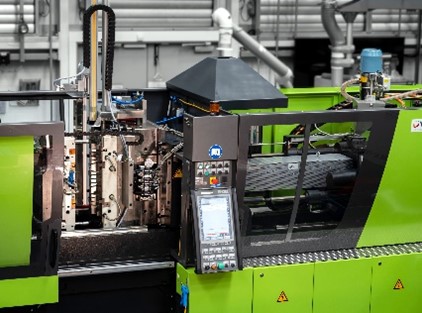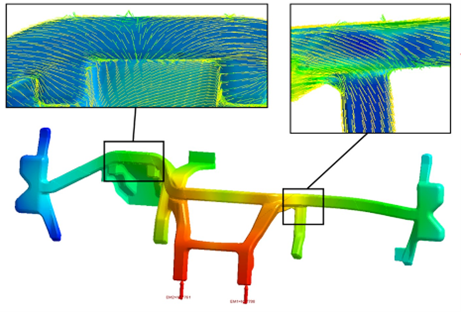Centre for Polymers and Composites

Centre for Polymers and Composites (CPC)
Centre for Polymers and Composites (CPC)
Welcome to the Centre for Polymers and Composites (CPC) at WMG, a leading research centre in the field of plastics and composites.
Our holistic approach integrates materials, manufacturing, design, and end-of-life solutions to drive advancements in the industry. With a rich history of innovation and technology transfer in plastics and composite processing, we have collaborated with numerous organizations, including large corporations and SMEs. From raw material suppliers to manufacturers and end users, we have developed and implemented sustainable plastic solutions across diverse sectors, including the development of new high-volume manufacturing technologies for automotive thermoset and thermoplastic composites.
Our research encompasses a wide range of topics in the field of plastics, composites, and elastomers. From process and structural simulation to materials formulation and industrially relevant processing methods like injection moulding, compression moulding, and extrusion, we conduct research across all stages and scales including fundamental characterization up to full-scale industrial manufacturing and test studies, ensuring the validity of simulations and demonstrating industrial feasibility.



About our Research
We work closely with industry partners to develop innovative sustainable solutions using polymers and polymer-based composites. Our research focuses on topics such as:
- Lightweighting for low emissions mobility - development of multi-material solutions based on polymer composites following the “right material at the right place” approach.
- Sustainability & circularity – development of holistic, environmentally conscious solutions based on sustainable and recycled materials.
- Added functionality – development of multifunctional plastics and composites through the use of hybridisation and nanotechnology.
- Process & structural simulation – the development, validation and application of simulation tools and 'end-to-end' workflows for processing and performance predictions of polymers and composites.
Focus Areas
High Volume Manufacturing
Our research supports the transition toward low-emission mobility by showcasing high-volume hybrid moulding technologies such as injection overmoulding and compression co-moulding to OEMs, Tier 1 suppliers, and SME injection moulders. Our Automated Composites Manufacturing line includes a 150-tonne preforming cell with a high level of automation and advanced material handling for shorter cycle times and minimised waste. Hybrid manufacturing processes combine enhanced performance, geometric complexity, and functional integration within a high-rate manufacturing environment.
Sustainable Composites
At CPC, sustainable composites research is a key focus. We develop composite materials using natural fibres, biobased plastics, and recycled carbon fibres or resins. Our latest HVM Catapult capability project evaluates the use of natural fibres such as flax and hemp in structural applications. We are also dedicated to developing manufacturing processes for discontinuous fibre composites, utilising recycled carbon fibres, and end-of-life or manufacturing waste streams while maintaining optimal balance in properties and processability.
Circular Plastics
We continue to work on initiatives to support the transition to circular plastics, focusing on innovative recycling technologies and biodegradable or compostable materials. Projects like “RecyPlast” use machine learning to improve sorting and compounding to produce high-spec plastics with high recycled content. Research on sustainable manufacturing of circular economy elastomer products, fully recyclable self-reinforced polymer composites, and mono-material-based packaging solutions including all-polyolefin high-barrier films is also ongoing.
Automation and Digitization
Recognising the key to high-volume manufacturing is automation, we're equipped with an automated cutting table, robotic pick-and-place for automated lay-up and automated systems for press-loading of materials. Moulds are equipped with instrumentation to optimise process parameters and key equipment is monitored to provide energy consumption data for cost modelling & LCA.
SMC Compounding
Our Schmidt & Heinzmann SMC Production Line gives us a unique, independent and small batch capability dedicated to Innovative R&D. Fully equipped with in-process areal weight measurement and heating station, we can compound carbon and glass fibres with a range of resins in a variety of formats and are developing technologies based on carbon fibre recyclate.
Multifunctional Composites
Innovative multifunctional composites are developed with responsive properties that sense external stimuli, enabling applications in temperature, light, humidity, load, and pressure-sensitive environments. Structural health monitoring concepts use conductive nanomaterials like graphene, to detect and diagnose damage or defects in structural composites, enhancing safety, reducing maintenance costs, and extending service life.
By utilizing smart conductive polymer composites, energy-efficient composite manufacturing processes have been developed, significantly reducing energy consumption compared to traditional oven or autoclave curing methods.
Modelling and Simulation
Simulation plays a crucial role in our research and development process. Our expertise in modelling and simulation supports partners in material selection, process optimisation, and part performance evaluation. We are developing reliable process simulation capabilities for key manufacturing processes such as injection moulding, compression moulding, preforming and resin transfer moulding. We have conducted several automotive case studies, highlighting weight savings through multi-material solutions and research on SMC, discontinuous long-fibre thermoplastics, prepregs, hybrid solutions, and durability.
Supporting Research
In addition to industrial injection and compression moulding facilities, we offer a wide range of extrusion processes including downstream cast film, blown film, fibre spinning, tape drawing, nanofibre and additive manufacturing equipment. Underpinning our academic research, we have thermal analysis, structural characterisation, microscopy, and mechanical testing facilities and have access to facilities such as XRD, XPS, CT-scanning, FTIR, Raman and SEM/TEM.
Facilities
- Formulation - We develop new or improved formulations for plastic materials. This can involve modifying the chemical composition of the plastic, or through the use of fibres, additives, and nanofillers. We have extensive capabilities to formulate polymers and composites across multiple scales, including twin-screw extrusion compounding, SMC compounding, two- and three-roll milling, kneaders and high-speed mixing.
- Moulding - We have a range of injection moulding machines from 6 to 140 tonnes including capabilities for micro-moulding, insert over-moulding, 2K or gas injection. We have equipment for RTM, HP-RTM, and four dedicated composite moulding presses ranging in capacity from a 10t laboratory press up to our 1700t multifunctional Engel V-Duo press, This also includes a 150t Automated Composite Manufacturing line for preforming or stamp-forming and a 150t multifunctional fast-closing Langzauner press optimised for processing thermoplastic composites.
- Extrusion - We have single screw extruders up to a diameter of 60 mm and a suite of 20 and 30 mm Collin extruders with down-stream cast film, blown film, fibre spinning, and tape drawing lines. We also have capabilities for additive manufacturing, including a CEAD E25 robot extruder, and equipment for the production of polymer nanofibers, including Elmarco's Nanospider and FibeRio's rotor spinning technology.
- Characterisation - We have state-of-the-art facilities in thermal analysis, structural characterization, microscopy, and mechanical characterization. Mechanical testing capabilities range from <1 N up to 250 kN, including static and fatigue, and dynamic/impact testing of up to 20 m/s and 10 kJ. In addition to standardised coupon testing, we routinely test up to sub-component level and use DIC systems, acoustic emission monitoring, Cpscan and thermal imaging. We also have access to a comprehensive suite of analytical equipment, including thermal analyses, microscopy, XRD, C-scan, fibre volume/length analysis, rheometry, FTIR, XPS, Raman, UV-vis and gas permeability measurements. We also develop bespoke testing facilities and non-standard material characterisation methods.
- Simulation - We assist companies with advanced simulations, utilizing state-of-the-art CAE software packages such as Moldex3D, Moldflow, Digimat, Genesis, and Ansys LS-Dyna for material selection, process optimization, and part performance. This enhances part quality and performance through improved material selection and process optimization in manufacturing processes like sheet forming, injection moulding, and compression moudling, as well as structural simulation and topological optimization.
Projects
We have an extensive track record of innovation and technology transfer in plastics and composite processing, with capabilities and facilities spanning a wide range of manufacturing processes. We are partners of the High-Value Manufacturing Catapult (HVMC) and collaborate with both large organizations and SMEs across various sectors to develop and implement sustainable plastic solutions.
Through collaborative projects with key stakeholders, including raw material suppliers, material processors, recyclers, and end users, we are committed to significantly reducing the environmental impact of plastics. By focusing on innovative recycling methods and energy-efficient manufacturing processes, we aim to create a closed-loop system that minimizes waste and maximizes resource efficiency. Our holistic approach not only promotes sustainability but also extends the lifecycle of plastic materials, contributing to a more sustainable future.
We have a long track record in developing high-volume composite manufacturing processes for lightweight automotive components and are involved in multi-partner projects with OEMs such as Ford, Jaguar Land Rover, and Aston Martin Lagonda. Our specialists combine technology with applied research to address the challenges the automotive industry faces in producing lighter vehicles with lower emissions and reduced environmental impact. Our dedicated facility enables the transition of new technologies and the development of high-volume production methods for both thermoset and thermoplastic composite components on an industrial scale, enhancing sustainability through minimized waste and the use of recyclates.
Centre for Polymers and Composites (CPC) - Recent Publications
Ready to work with WMG?
Register your interest in our polymer research to start the conversation with us.
